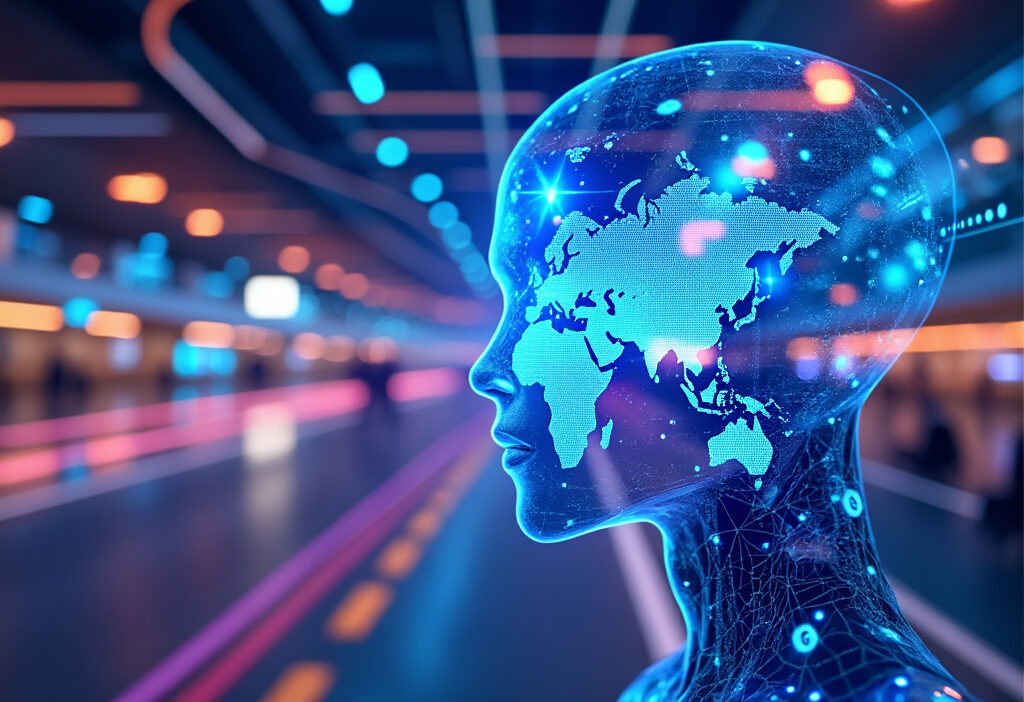AI Transformations: Shaping the Future of Travel in 2025
In 2025, Artificial Intelligence (AI) has become a cornerstone of the travel industry, fundamentally altering how we plan, experience, and reflect on our journeys. From AI-driven personalized trip planning to smart airport experiences, this transformative technology is enhancing efficiency, customization, and enjoyment for travelers and providers alike. This article delves into the major trends, innovations, and benefits that AI brings to the world of travel.
The Dawn of AI in Travel Planning
The travel industry in 2025 has embraced AI-driven personalization at an unprecedented scale, transforming how travelers plan and book their journeys. Gone are the days of generic recommendations—today’s AI platforms analyze vast datasets, from social media preferences to past booking behavior, to craft hyper-personalized itineraries. Google’s AI itinerary planner, for instance, doesn’t just suggest destinations; it predicts traveler moods, recommending serene beach getaways for stress relief or vibrant city tours for adventure seekers. These systems leverage natural language processing (NLP) to interpret vague requests like “a relaxing trip with good food” and turn them into detailed, bookable plans.
Real-time alerts powered by AI have also become indispensable. Travelers receive dynamic updates on flight delays, weather disruptions, or even crowd levels at attractions, allowing for seamless adjustments. This proactive approach has led to a 28% rise in customer satisfaction, as reported by industry surveys. AI’s ability to cross-reference data—such as linking weather forecasts with alternative activity suggestions—ensures trips remain enjoyable despite unforeseen changes.
Booking platforms have seen a 35% increase in conversions thanks to AI’s predictive pricing and loyalty incentives. Machine learning algorithms analyze booking patterns to offer optimal deals, while chatbots handle complex queries in seconds, reducing abandonment rates. The integration of generative AI has further elevated the experience, with virtual assistants crafting tailored travelogues or even negotiating upgrades on behalf of users.
As AI continues to refine travel planning, its next frontier lies in reshaping the physical journey—starting with airports. The seamless digital experience now extends to biometric check-ins and AI-driven operational efficiency, setting the stage for a frictionless travel ecosystem.
Revolutionizing Airport Experiences with AI
The travel industry in 2025 is witnessing a seismic shift in airport operations, thanks to AI-powered biometric systems. These innovations are transforming the passenger experience by eliminating bottlenecks and reducing wait times. Heathrow Airport, for instance, has implemented facial recognition technology at security checkpoints and boarding gates, cutting passenger processing times by 40%. This seamless integration of AI not only enhances convenience but also strengthens security by cross-referencing biometric data with global watchlists in real time.
Beyond identity verification, AI is optimizing airport logistics. Advanced predictive analytics now forecast weather disruptions with unprecedented accuracy, allowing airlines to proactively adjust schedules and minimize delays. Machine learning algorithms analyze historical weather patterns, flight data, and even social media feeds to predict turbulence or storms, giving airports like Dubai International a 30% improvement in on-time departures. These systems also dynamically reroute baggage handling operations, ensuring luggage reaches connecting flights even during tight turnarounds.
AI-driven automation extends to retail and hospitality within terminals. Smart kiosks equipped with natural language processing guide passengers to gates, recommend dining options based on dietary preferences, and even suggest last-minute duty-free purchases tailored to individual spending habits. The result? A frictionless journey where every touchpoint—from check-in to boarding—is personalized and efficient.
As AI continues to refine airport ecosystems, the next frontier lies in voice-enabled assistance, bridging the gap between digital convenience and human-centric service—a transition explored in the following chapter.
AI Voice Assistants and Customer Support
AI voice assistants and chatbots are redefining customer support in the travel industry, offering seamless, 24/7 assistance that bridges gaps left by traditional human-operated services. By 2025, these AI-driven solutions have evolved beyond scripted responses, leveraging natural language processing (NLP) and machine learning to handle complex queries, manage bookings, and even adjust itineraries in real time. Unlike the biometric systems discussed earlier, which streamline physical processes, AI voice agents focus on enhancing digital interactions, ensuring travelers receive instant, personalized support without delays.
One standout example is Singapore Airlines’ Kris chatbot, which integrates with messaging platforms like WhatsApp and Facebook Messenger. Kris doesn’t just answer FAQs—it processes flight changes, suggests alternative routes during disruptions, and even predicts passenger needs based on past behavior. This level of responsiveness eliminates the frustration of long call-center waits, a stark contrast to the pre-AI era. Similarly, Marriott’s AI concierge, powered by generative AI, assists guests with room upgrades, local recommendations, and multilingual support, creating a frictionless experience from booking to checkout.
Behind the scenes, these systems analyze vast datasets—from weather forecasts to historical booking patterns—to proactively address issues before they escalate. For instance, if a connecting flight is delayed, AI assistants instantly rebook passengers and notify them via their preferred channel, reducing stress and downtime. This predictive capability complements the dynamic pricing strategies explored in the next chapter, where AI optimizes costs in real time. Together, these innovations illustrate how AI isn’t just automating tasks but reimagining the entire travel journey, making it more intuitive, efficient, and customer-centric.
Dynamic Pricing Strategies in AI
AI-powered dynamic pricing is reshaping the travel industry by leveraging vast datasets and predictive analytics to optimize costs for both consumers and providers. Unlike traditional static pricing models, AI-driven systems analyze real-time demand, competitor pricing, historical trends, and even external factors like weather or events to adjust prices dynamically. For travelers, this means unprecedented access to personalized deals and cost-saving opportunities.
Companies like Hopper utilize machine learning to predict price fluctuations with up to 95% accuracy, advising users on the best time to book flights or hotels. These systems process billions of data points—from past booking patterns to seasonal demand shifts—enabling travelers to lock in lower fares before prices surge. Airlines and hotels benefit too, as AI maximizes revenue by adjusting prices in real time to fill empty seats or rooms without resorting to last-minute discounts.
Beyond forecasting, AI enhances dynamic bundling, where algorithms combine flights, accommodations, and activities into tailored packages at competitive rates. This not only improves occupancy rates for providers but also simplifies planning for travelers. Additionally, reinforcement learning helps balance supply and demand, ensuring pricing remains competitive while avoiding over-discounting.
The shift to AI-driven pricing marks a win-win scenario: travelers save money, and businesses optimize revenue. As these systems evolve, they’ll integrate deeper with sustainability metrics—setting the stage for the next chapter’s focus on eco-conscious travel decisions powered by AI insights. The result? A smarter, more efficient travel ecosystem where cost and convenience align seamlessly.
Sustainable Travel and AI Insights
As AI continues to reshape the travel industry, its role in promoting sustainability is becoming increasingly vital. In 2025, AI-driven tools are empowering travelers and companies to make eco-conscious decisions without sacrificing convenience or affordability. Unlike dynamic pricing strategies, which focus on cost optimization, these solutions prioritize environmental impact, helping the industry meet global sustainability goals.
One key application is carbon footprint analysis. AI algorithms now evaluate the environmental cost of flights, hotels, and transportation options in real time, suggesting greener alternatives. For instance, platforms like Google Travel and Kayak integrate AI to highlight low-emission routes or carbon-offset programs, allowing users to compare sustainability metrics alongside pricing. Meanwhile, airlines leverage AI to optimize fuel consumption, reducing emissions by analyzing weather patterns, flight paths, and aircraft weight.
AI also enhances policy compliance for businesses. Corporate travel managers use predictive analytics to ensure adherence to sustainability regulations, automatically booking eco-certified hotels or enforcing green travel policies. Machine learning models even forecast the long-term environmental impact of travel patterns, enabling companies to adjust strategies proactively.
For budget-conscious travelers, AI balances cost and sustainability. Apps like EcoWander recommend affordable, eco-friendly accommodations by analyzing energy efficiency, waste management, and local conservation efforts. Similarly, ride-sharing platforms employ AI to promote carpooling or electric vehicle options, minimizing both expenses and ecological footprints.
By 2025, AI isn’t just streamlining travel—it’s making it responsible. As the next chapter explores immersive AI experiences, this foundation of sustainability ensures that innovation aligns with environmental stewardship, creating a future where travel is both cutting-edge and conscientious.
Immersive Experiences Through AI Integration
In 2025, AI-powered immersive experiences are redefining how travelers engage with destinations before, during, and after their journeys. By seamlessly integrating with augmented reality (AR) and virtual reality (VR), AI enables hyper-realistic virtual tours that allow users to explore hotels, landmarks, and cultural sites from their homes. These digital previews are no longer static—AI dynamically adjusts the experience based on user preferences, offering personalized recommendations and even simulating weather conditions or crowd levels for accurate trip planning.
On-site, AI-driven AR overlays transform navigation and exploration. Smart glasses or mobile apps provide real-time translations of street signs, menus, and conversations, breaking language barriers effortlessly. AI-enhanced guided tours adapt to a traveler’s pace and interests, using geolocation and past behavior to suggest hidden gems or historical anecdotes. For instance, pointing a device at a monument might trigger an interactive AI narrator, delivering context in the user’s native language while adjusting the tone for children or history enthusiasts.
Accessibility reaches new heights as AI tailors experiences for travelers with disabilities. Voice-guided VR tours with haptic feedback enable visually impaired users to “feel” architectural details, while real-time captioning and sign language avatars empower deaf travelers. These innovations align with the sustainability focus of the previous chapter by reducing physical overcrowding through virtual alternatives, while setting the stage for the next chapter’s exploration of AI’s broader traveler benefits—efficiency, personalization, and deeper cultural connections.
The fusion of AI, AR, and VR isn’t just enhancing travel—it’s creating a new paradigm where every journey is as unique as the traveler.
The Impact of AI on Traveler Benefits
Artificial Intelligence is reshaping the travel experience in 2025 by delivering unprecedented benefits to travelers, from cost and time savings to hyper-personalized journeys. AI-powered tools like dynamic pricing algorithms and smart itinerary planners analyze vast datasets to optimize flight and accommodation choices, reducing costs by up to 30% compared to traditional booking methods. For instance, platforms like Hopper and Kayak leverage predictive analytics to advise users on the best time to book, ensuring maximum savings.
Beyond financial advantages, AI enhances customer experiences through real-time assistance. Chatbots and virtual concierges, powered by natural language processing, resolve queries instantly—whether rebooking a flight or recommending local attractions—eliminating long wait times. Companies like Expedia and Booking.com report a 40% reduction in customer service response times thanks to AI-driven support systems.
Hyper-personalization is another game-changer. AI analyzes past behavior, social media activity, and even biometric data to curate bespoke travel experiences. Imagine an AI that suggests a secluded beach in Bali based on your Instagram likes or adjusts your hotel room’s lighting and temperature via facial recognition. This level of customization boosts satisfaction, with 68% of travelers in a 2024 survey stating they’d pay more for tailored itineraries.
AI also streamlines logistics. Smart luggage tracking and automated check-ins minimize stress, while real-time translation earbuds break language barriers—complementing the immersive AR/VR experiences discussed earlier. These innovations collectively make travel smoother, cheaper, and more enjoyable, setting the stage for the next chapter’s focus on how AI optimizes operations for travel providers.
Boosting Operational Efficiency for Travel Providers
In 2025, AI is no longer just a tool for enhancing traveler experiences—it has become the backbone of operational efficiency for travel providers. By automating repetitive tasks, minimizing human error, and delivering data-driven insights, AI is reshaping how airlines, hotels, and agencies manage their workflows.
One of the most significant impacts is the reduction of staff workload. AI-powered chatbots and virtual assistants handle up to 80% of routine customer inquiries, freeing human agents to focus on complex issues. Automated check-in systems at airports and hotels, powered by facial recognition and natural language processing, streamline processes that once required manual intervention. This not only cuts costs but also reduces wait times, improving overall service quality.
AI also minimizes human error in critical operations. For example, airlines use predictive maintenance algorithms to monitor aircraft health in real time, flagging potential issues before they escalate. This proactive approach reduces delays and cancellations, saving millions in operational costs. Similarly, AI-driven inventory management systems optimize hotel room pricing and airline seat allocation, ensuring maximum revenue with minimal manual input.
Data analytics plays a pivotal role in decision-making. AI processes vast amounts of historical and real-time data to forecast demand, adjust pricing dynamically, and even predict staffing needs. For instance, hotels leverage AI to analyze booking trends, enabling them to allocate resources efficiently during peak seasons.
The integration of AI into operations isn’t just about efficiency—it’s about transforming the industry’s core functions. As travel providers embrace these innovations, they set the stage for the next wave of AI-driven growth, seamlessly connecting to the broader trends of automation and market expansion discussed in the following chapter.
Forecasting the Future: AI’s Growth in the Travel Market
The travel industry is undergoing a seismic shift as AI adoption accelerates, reshaping how consumers plan, book, and experience their journeys. By 2027, the AI travel market is projected to reach $423.7 billion, driven by a surge in demand for hyper-personalized and automated solutions. This growth reflects a broader societal shift toward AI-driven convenience, where travelers increasingly rely on intelligent systems to handle everything from itinerary curation to real-time assistance.
AI’s role in travel planning has evolved beyond simple chatbots or recommendation engines. Advanced algorithms now analyze vast datasets—including past bookings, social media preferences, and even weather patterns—to predict and suggest tailored experiences. For instance, AI-powered platforms can automatically adjust travel plans based on disruptions, offering alternative flights or accommodations before the traveler even notices an issue. This anticipatory intelligence reduces stress and elevates satisfaction, fostering loyalty in an increasingly competitive market.
The rise of generative AI has further revolutionized interactions, enabling dynamic, context-aware conversations that mimic human travel agents. Virtual assistants now handle complex queries, such as multi-destination itineraries or niche activity recommendations, with near-human nuance. Meanwhile, predictive analytics empower businesses to forecast demand spikes, optimize pricing, and allocate resources efficiently—ensuring smoother operations behind the scenes.
As AI becomes ubiquitous, its integration signals a fundamental change in service delivery: automation isn’t just about efficiency—it’s about crafting seamless, individualized journeys. The next frontier lies in blending AI with emerging technologies like augmented reality and IoT, creating a travel ecosystem where every touchpoint is intuitive, adaptive, and deeply personalized. The future of travel isn’t just automated; it’s intelligently orchestrated.
Reimagining Travel: The Intelligent Journey
In 2025, travel is no longer just about reaching a destination—it’s about the intelligence embedded in every step of the journey. AI has transformed the experience from a series of disconnected tasks into a seamless, anticipatory process. Gone are the days of manual bookings, generic itineraries, and frustrating delays. Instead, AI-driven platforms now orchestrate travel with precision, learning from user behavior to deliver hyper-personalized recommendations.
Personalization at Scale is the cornerstone of this revolution. AI analyzes past preferences, social media activity, and even biometric data to craft bespoke travel plans. Imagine an itinerary that adjusts in real-time based on weather disruptions, local events, or your energy levels—suggesting a quiet café when you’re fatigued or an adrenaline-packed activity when you’re energized. Voice-activated AI assistants, integrated into wearables and smart luggage, act as 24/7 concierges, resolving issues before they arise.
Frictionless Mobility is another leap forward. Autonomous vehicles and AI-optimized public transit reduce congestion, while facial recognition and biometric passports eliminate airport queues. Hotels leverage IoT and AI to create smart rooms that adapt to your preferences—adjusting lighting, temperature, and even aromatherapy scents upon arrival.
Perhaps most transformative is AI’s ability to anticipate needs. Predictive analytics forecast travel disruptions, rerouting flights or rebooking hotels proactively. Emotion-sensing AI detects stress or dissatisfaction, offering solutions—like a complimentary upgrade—before complaints arise.
This intelligent journey isn’t just convenient; it’s intuitive. By 2025, AI doesn’t just assist travelers—it understands them, turning every trip into a curated experience where technology fades into the background, leaving only the joy of exploration.

Conclusions
By 2025, AI has successfully redefined the travel landscape, establishing a new era of intelligent, efficient, and personalized travel experiences. Through automation, personalization, and the seamless integration of cutting-edge technologies, travelers and providers enjoy enhanced convenience, reduced costs, and operational efficiencies. The future of travel, powered by AI, is one of endless possibilities, where every journey is optimized for satisfaction and sustainability.



